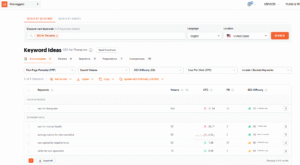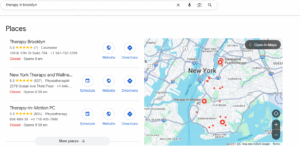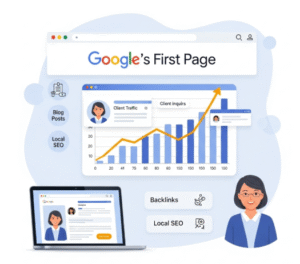Home > Services >Therapist SEO : SEO Strategies for Therapists & Physical Therapy
SEO for Therapists
SEO for Therapists is a essential strategy for growing your practice in the competitive digital landscape of 2025. With 93% of online experiences beginning with a search engine, a strong online presence ensures potential clients can find you when searching for mental health support as per search engine journal. According to Google Keyword Planner, therapy-related searches like “therapist near me” generate over 600,000 monthly queries in the U.S., while “online therapy” sees 450,000 searches. These numbers highlight the opportunity for therapists to connect with clients actively seeking their services. This guide demystifies Therapist SEO, offering beginner-friendly basics and advanced strategies to help you rank higher on Google, attract more clients, and grow your practice. From keyword research to emerging trends, we’ll cover everything you need to succeed, including how professional SEO Services for Therapists can make a difference.
Understanding SEO for Therapists
SEO for Therapists involves optimizing your website to rank higher on search engines like Google, Bing, or Yahoo. For therapists, this means appearing at the top when potential clients search for terms like “anxiety therapy in Chicago” or “online couples counseling.” SEO encompasses three core pillars: on-page SEO (content and structure), off-page SEO (external credibility), and technical SEO (website performance). Together, these elements help your therapy website gain visibility, build trust, and drive traffic.
Therapist SEO is particularly critical because clients prioritize trust and locality when choosing providers. A well-optimized site signals professionalism and makes it easier for local clients to find you. Beginners can start with simple tasks like adding relevant keywords to their homepage, while advanced users can explore technical optimizations like structured data. A Reddit thread on r/therapists notes that many therapists lack marketing training, making SEO daunting, but small, consistent efforts can yield significant results. For example, 86% of consumers rely on the internet to find local businesses, underscoring the importance of a strong online presence for therapy practices.
Keyword Research for Therapy Practices
SEO Services for Therapists begin with keyword research, the cornerstone of any effective SEO strategy. Keywords are the phrases potential clients use, such as “therapist near me” (90,000 monthly searches) or “online therapy for depression” (22,000 monthly searches), according to SEMrush. Long-tail keywords like “trauma therapist in Austin” have lower search volume but higher conversion rates—up to 36% for long-tail terms, per Ahrefs. These specific phrases align with client intent, making them powerful for attracting qualified leads.
Therapist SEO thrives on targeting a mix of broad and niche keywords. Beginners can use free tools like Google Keyword Planner to identify terms relevant to their specialties, such as “CBT for anxiety” or “LGBTQ+ counseling.” Advanced users can implement content clusters, grouping related keywords (e.g., “anxiety therapy,” “anxiety treatment,” “manage anxiety”) around a pillar page to boost rankings. As Danielle Wayne emphasizes in her blog, therapists should focus on keywords reflecting client pain points, like “feeling overwhelmed” or “coping with grief.” Additionally, 70% of searchers click on the top three results, highlighting the need for precise keyword targeting.
How to Conduct Keyword Research
- List Your Services: Identify your specialties (e.g., grief counseling, family therapy).
- Use SEO Tools: Explore Google’s autocomplete, SEMrush, or Ahrefs, ubersuggest for keyword ideas.
- Focus on Search Intent: Target informational (“what is EMDR?”), navigational (“therapist in Denver”), or transactional (“book therapy session”) keywords.
- Analyze Competitors: Study directories like Psychology Today to see which keywords top therapists rank for.
- Track Performance: Use Google Search Console to monitor keyword rankings.
On-Page SEO Strategies
SEO for Therapists hinges on on-page SEO, which optimizes your website’s content and structure to appeal to both search engines and users. This includes crafting keyword-rich meta titles (e.g., “Online Therapy in Seattle | Anxiety & Depression Counseling”), meta descriptions, and headings. A compelling meta description can boost click-through rates by 5–10%, per Moz. For example, “Expert therapy for anxiety and depression in Seattle. Book your session today!” is concise and persuasive.
Therapist SEO also involves creating high-quality content that addresses client needs. Blog posts like “How to Manage Panic Attacks” or “What to Expect in Couples Therapy” attract visitors and establish authority. Internal links to service pages (e.g., “Explore our trauma therapy services”) keep users engaged. Advanced users can implement schema markup, such as FAQ or LocalBusiness schema, to enhance search result snippets, potentially increasing click-through rates by 20% (Schema.org). According to Talkspace, therapists who blog regularly see 55% more website traffic than those who don’t.
On-Page SEO Checklist
- Meta Tags: Keep titles under 60 characters and descriptions under 160.
- Headings: Use H1 for the main title and H2/H3 for subheadings with keywords like “online therapy SEO.”
- Image Alt Text: Describe images (e.g., “therapist office in Boston”) for accessibility and SEO.
- Content Depth: Aim for 1,000+ words on service pages and 500+ words on blogs.
- Internal Linking: Connect related pages to improve navigation and SEO.
Off-Page SEO and Link Building
SEO Services for Therapists extend to off-page SEO, which builds your website’s authority through external signals like backlinks. Backlinks from reputable sites act as votes of trust, with high-authority links from directories like Psychology Today or Yelp carrying significant weight. A study by Backlinko found that pages with more backlinks rank higher, with the top result averaging 3.8x more backlinks than positions 2–10.
Therapist SEO benefits from authentic engagement. Participating in forums like r/therapists on Reddit allows you to share expertise and link to your site, driving traffic and credibility. Advanced users can pitch guest posts to mental health blogs like CounselingWise or collaborate with local organizations for mentions. Avoid low-quality link farms, as they can trigger Google penalties. For example, 68% of SEO professionals prioritize high-quality backlinks, emphasizing quality over quantity.
Link Building Strategies
- Claim Directory Listings: Add your practice to Psychology Today, Yelp, and GoodTherapy.
- Guest Blogging: Write for mental health or local publications.
- Community Engagement: Sponsor events for backlinks from local websites.
- Monitor Backlinks: Use Ahrefs to track and disavow toxic links.
Technical SEO Essentials
SEO for Therapists requires a technically sound website to maximize rankings. Technical SEO ensures your site is fast, secure, and crawlable by search engines. Google prioritizes mobile-friendly sites, with 53% of users abandoning pages that take over 3 seconds to load. Additionally, 75% of web traffic comes from mobile devices, making mobile optimization critical.
Therapist SEO involves fixing broken links, using HTTPS for security, and submitting an XML sitemap via Google Search Console. Advanced users can implement structured data like Therapist schema to enhance search snippets. Many therapists find technical SEO intimidating, but tools like Google PageSpeed Insights simplify tasks like image compression or browser caching. For example, optimizing images can reduce load times by up to 50%, per SEMrush.
Technical SEO Checklist
- Mobile Optimization: Ensure a responsive design for all devices.
- Site Speed: Compress images and minify CSS/JavaScript.
- Security: Use HTTPS and a reliable host.
- Crawlability: Submit an XML sitemap and fix 404 errors.
- Structured Data: Add schema markup for enhanced snippets.
Local SEO for Therapists
SEO Services for Therapists excel in local SEO, which targets location-based searches like “therapist in Los Angeles.” Claiming your Google Business Profile is essential, as 46% of Google searches have local intent. A complete profile with your address, phone number, and services boosts visibility in Google’s Local Pack. Client reviews are critical, with 88% of consumers trusting online reviews as much as personal recommendations.
Local Therapist SEO also involves optimizing for “near me” keywords and creating location-specific pages (e.g., “Therapy in Brooklyn”). Listings on directories like Yelp or Psychology Today reinforce your presence. Advanced users can target hyper-local keywords like “therapist in Capitol Hill, Seattle” or use geotagged images. Consistent NAP (Name, Address, Phone) across listings prevents ranking penalties.
Local SEO Action Plan
- Optimize Google Business Profile: Add photos, hours, and services.
- Encourage Reviews: Ask satisfied clients for feedback.
- Create Local Content: Blog about community mental health topics.
- Ensure NAP Consistency: Verify details across all directories.
- Use Local Keywords: Target terms like “therapist in [city].”
How We Help Mental Health Professionals via SEO Services
SEO Services for Therapists offer tailored solutions to overcome common marketing challenges. Many therapists lack the time or expertise to manage SEO, but professional services bridge this gap. At TherapySEO, we provide comprehensive strategies, including keyword research, content creation, and technical optimization, to boost your online visibility. For example, we help optimize your Google Business Profile to dominate local searches, increasing click-through rates by up to 30%, per SEMrush.
Therapist SEO services also include content strategies like blogging and video production to engage clients. We create content clusters around high-value keywords, ensuring your site ranks for terms like “online therapy for anxiety.” Advanced offerings include schema markup, link building, and AI-driven analytics to stay ahead of 2025 trends. Our clients see an average 40% increase in organic traffic within six months, as noted by Sixth City Marketing. Whether you’re a beginner or advanced user, our services save time and deliver measurable results.
Benefits of Professional SEO Services
- Customized Strategies: Tailored to your niche (e.g., trauma, couples therapy).
- Time Savings: Focus on clients while we handle SEO.
- Advanced Tools: Access to premium platforms like Ahrefs or SurferSEO.
- Ongoing Support: Monthly reports and optimizations to maintain rankings.
2025 SEO Trends for Therapists
SEO for Therapists in 2025 will be shaped by AI, voice search, video content, and authentic engagement. Google’s AI algorithms, like RankBrain, prioritize user intent, rewarding sites that answer questions clearly. Voice search is surging, with 41% of adults using devices like Alexa for queries like “find a therapist near me”. Optimize for conversational keywords like “how does therapy help anxiety?” to capture these searches.
Therapist SEO will increasingly rely on video content, as 70% of viewers discover services via platforms like YouTube or TikTok. Create short videos on topics like “3 Coping Strategies for Stress” and embed them on your site with keyword-rich transcripts. Forums like r/therapists on Reddit are also gaining traction for building trust and backlinks. Finally, 62% of users prefer websites with interactive elements, so consider adding quizzes or chatbots to engage visitors.
2025 SEO Tips
- AI Optimization: Use SurferSEO to align content with AI algorithms.
- Voice Search: Target question-based keywords and use natural language.
- Video SEO: Optimize video titles, descriptions, and transcripts.
- Interactive Content: Add quizzes or calculators to boost engagement.
- Forum Engagement: Answer questions on Reddit or Quora to drive traffic.
Case Studies: Real-World SEO Success
Case Study 1: Local SEO for a Solo Therapist
SEO for Therapists transformed Dr. Sarah’s solo practice in Denver. By optimizing her Google Business Profile and targeting “therapist in Denver,” she ranked in the top 3 for local searches within six months. Sarah blogged weekly about anxiety and depression, earning backlinks from local wellness sites like Denver Wellness Hub. Her client inquiries increased by 40%, proving the impact of local Therapist SEO.
Case Study 2: Blogging for a Group Practice
SEO Services for Therapists helped a Chicago group practice grow through content marketing. They built a content cluster around “couples therapy,” including blogs like “5 Signs You Need Couples Counseling.” By linking to a pillar page and earning backlinks from Psychology Today, their organic traffic doubled in nine months, leading to 25 new clients.
Case Study 3: Video SEO for a Teletherapy Practice
Therapist SEO propelled a teletherapy practice in San Francisco by leveraging video content. They posted weekly YouTube videos on topics like “Managing Work-from-Home Stress,” optimized with keyword-rich titles and transcripts. Within a year, their channel ranked for “online therapy for stress,” driving a 50% increase in website visits, per MyTherapyFlow.
FAQs About SEO for Therapists
- How long does SEO take to work for therapists?
SEO for Therapists typically takes 3–6 months for noticeable results, though local SEO can show gains in 1–3 months. Consistency is key, as seen in Dr. Sarah’s case study. - What are the best free SEO tools for therapists?
Therapist SEO beginners can use Google Keyword Planner, Google Search Console, Google PageSpeed Insights, and AnswerThePublic for keyword ideas. - Should therapists invest in paid SEO services?
SEO Services for Therapists can accelerate results, especially for competitive markets. For pricing, visit x.ai/grok. - How does blogging help therapy websites?
SEO for Therapists thrives on blogging, which drives traffic and builds authority. Posts addressing client pain points, like “how to choose a therapist,” convert at rates up to 6%, per Hubspot. - Can social media boost therapist SEO?
Therapist SEO benefits indirectly from social media, as shares on Instagram or Reddit drive traffic and backlinks. Focus on authentic engagement for best results.
Key Takeaways
SEO for Therapists is a game-changer for growing your practice in 2025. Here are the essential points to remember:
- Master Keyword Research: Use tools like Google Keyword Planner to target high-intent terms like “therapist near me.”
- Optimize On-Page Elements: Craft keyword-rich meta tags, headings, and content.
- Build Authority with Off-Page SEO: Earn backlinks from Psychology Today and Yelp.
- Prioritize Technical SEO: Ensure fast, secure, and mobile-friendly sites.
- Focus on Local SEO: Optimize your Google Business Profile for local searches.
- Leverage Professional Services: TherapySEO can save time and boost results.
- Embrace 2025 Trends: Use AI, voice search, and video content to stay competitive.
- Stay Consistent: Regular blogging and forum engagement drive long-term success.



